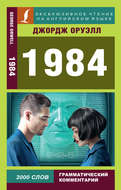Kitabı oku: «Зеленая миля / The Green Mile», sayfa 5
Part Two
The Mouse on the Mile
1
The nursing home where I am crossing my last bunch of t’s and dotting my last mess of i’s is called Georgia Pines. It’s about sixty miles from Atlanta and about two hundred light-years from life as most people—people under the age of eighty, let’s say—live it. You who are reading this want to be careful that there isn’t a place like it waiting in your future. It’s not a cruel place, not for the most part; there’s cable TV, the food’s good (although there’s damned little a man can chew), but in its way, it’s as much of a killing bottle as E Block at Cold Mountain ever was.
There’s even a fellow here who reminds me a little of Percy Wetmore, who got his job on the Green Mile because he was related to the governor of the state. I doubt if this fellow is related to anyone important, even though he acts that way. Brad Dolan30, his name is. He’s always combing his hair, like Percy was, and he’s always got something to read stuffed into his back pocket. With Percy it was magazines like Argosy and Men’s Adventure; with Brad it’s these little paperbacks called Gross jokes and Sick jokes. He’s always asking people why the Frenchman crossed the road or how many Polacks it takes to screw in a lightbulb or how many pallbearers there are at a Harlem funeral. Like Percy, Brad is a dimwit who thinks nothing is funny unless it’s mean.
Something Brad said the other day struck me as actually smart, but I don’t give him a lot of credit for it; even a stopped clock is right twice a day, the proverb has it. “You’re just lucky you don’t have that Alzheimer’s disease, Paulie,” was what he said. I hate him calling me that, Paulie, but he goes on doing it, anyway; I’ve given up asking him to quit. There are other sayings—not quite proverbs—that apply to Brad Dolan: “You can lead a horse to water but you can’t make him drink” is one; “You can dress him up but you can’t take him out” is another. In his thickheadedness he is also like Percy.
When he made his comment about Alzheimer’s, he was mopping the floor of the solarium, where I had been going over the pages I have already written. There’s a great lot of them, and I think there’s apt to be a great lot more before I am through. “That Alzheimer’s, do you know what it really is?”
“No,” I said, “but I’m sure you’ll tell me, Brad.”
“It’s AIDS for old people,” he said, and then burst out laughing, hucka-hucka-hucka-huck!, just like he does over those idiotic jokes of his.
I didn’t laugh, though, because what he said struck a nerve somewhere. Not that I have Alzheimer’s; although there’s plenty of it on view here at beautiful Georgia Pines, I myself just suffer the standard old guy memory problems. Those problems seem to have more to do with when than what. Looking over what I have written so far, it occurs to me that I remember everything that happened back in ‘32; it’s the order of events that sometimes gets confused in my head. Yet, if I’m careful, I think I can keep even that sorted out. More or less.
John Coffey came to E Block and the Green Mile in October of that year, condemned for the murder of the nine-year-old Detterick twins. That’s my major landmark, and if I keep it in view, I should do just fine. William “Wild Bill” Wharton came after Coffey; Delacroix came before. So did the mouse, the one Brutus Howel—Brutal, to his friends—called Steamboat Willy and Delacroix ended up calling Mr. Jingles.
Whatever you called him, the mouse came first, even before Del—it was still summer when he showed up, and we had two other prisoners on the Green Mile: The Chief, Arlen Bitterbuck; and The Pres, Arthur Flanders.
That mouse. That goddam mouse. Delacroix loved it, but Percy Wetmore sure didn’t.
Percy hated it from the first.
2
The mouse came back just about three days after Percy had chased it down the Green Mile that first time. Dean Stanton and Bill Dodge were talking politics, which meant in those days, they were talking Roosevelt and Hoover—Herbert, not J. Edgar. They were eating Ritz crackers from a box Dean had purchased from old Toot-Toot an hour or so before. Percy was standing in the office doorway, practicing quick draws with the baton he loved so much, as he listened. He’d pull it out of that ridiculous handtooled holster he’d gotten somewhere, then twirl it (or try to; most times he would have dropped it if not for the rawhide loop he kept on his wrist), then re-holster it. I was off that night, but got the full report from Dean the following evening.
The mouse came up the Green Mile just as it had before, hopping along, then stopping and seeming to check the empty cells. After a bit of that it would hop on, undiscouraged, as if it had known all along it would be a long search, and it was up to that.
The President was awake this time, standing at his cell door. That guy was a piece of work, managing to look natty even in his prison blues. We knew just by the way he looked that he wasn’t made for Old Sparky, and we were right—less than a week after Percy’s second run at that mouse, The Pres’s sentence was commuted to life and he joined the general population.
“Say!” he called. ‘‘There’s a mouse in here! What kind of a joint are you guys running, anyway?” He was kind of laughing, but Dean said he also sounded kind of outraged, as if even a murder rap hadn’t been quite enough to knock the Kiwanis out of his soul. He had been the regional head of an outfit called Mid-South Realty Associates, and had thought himself smart enough to be able to get away with pushing his half-senile father out a third-story window and collect on a double-indemnity whole-life policy. On that he had been wrong, but maybe not by much.
“Shut up, you lugoon,” Percy said, but that was pretty much automatic. He had his eye on the mouse. He had re-holstered his baton and taken out one of his magazines, but now he tossed the magazine on the duty desk and pulled the baton out of its holster again. He began tapping it casually against the knuckles of his left hand.
“Son of a bitch,” Bill Dodge said. “I’ve never seen a mouse in here before.”
“Aw, he’s sort of cute,” Dean said. “And not afraid at all.”
“How do you know?”
“He was in the other night. Percy saw him, too. Brutal calls him Steamboat Willy.”
Percy kind of sneered at that, but for the time being said nothing. He was tapping the baton faster now on the back of his hand.
“Watch this,” Dean said. “He came all the way up to the desk before. I want to see if he’ll do it again.”
It did, skirting wide of The Pres on its way, as if it didn’t like the way our resident parricide smelled. It checked two of the empty cells, even ran up onto one of the bare, unmattressed cots for a sniff, then came back to the Green Mile. And Percy standing there the whole time, tapping and tapping, not talking for a change, wanting to make it sorry for coming back. Wanting to teach it a lesson.
“Good thing you guys don’t have to put him in Sparky,” Bill said, interested in spite of himself. “You’d have a hell of a time getting the clamps and the cap on.”
Percy said nothing still, but he very slowly gripped the baton between his fingers, the way a man would hold a good cigar.
The mouse stopped where it had before, no more than three feet from the duty desk, looking up at Dean like a prisoner before the bar. It glanced up at Bill for a moment, then switched its attention back to Dean. Percy it hardly seemed to notice at all.
“He’s a brave little barstid, I got to give him that,” Bill said. He raised his voice a little. “Hey! Hey! Steamboat Willy!”
The mouse flinched a little and fluttered its ears, but it didn’t run, or even show any signs of wanting to.
“Now watch this,” Dean said, remembering how Brutal had fed it some of his corned-beef sandwich. “I don’t know if he’ll do it again, but—”
He broke off a piece of Ritz cracker and dropped it in front of the mouse. It just looked with its sharp black eyes at the orangey fragment for a second or two, its filament-fine whiskers twitching as it sniffed. Then it reached out, took the cracker in its paws, sat up, and began to eat.
“Well. I’ll be shucked and boiled!” Bill exclaimed. “Eats as neat as a parson on parish house Saturday night!”
“Looks more like a nigger eating watermelon to me,” Percy remarked, but neither guard paid him any mind. Neither did The Chief or The Pres, for that matter. The mouse finished the cracker but continued to sit, seemingly balanced on the talented coil of its tail, looking up at the giants in blue.
“Lemme try,” Bill said. He broke off another piece of cracker, leaned over the front of the desk, and dropped it carefully. The mouse sniffed but did not touch.
“Huh,” Bill said. “Must be full.”
“Nah,” Dean said, “he knows you’re a floater, that’s all.”
“Floater, am I? I like that! I’m here almost as much as Harry Terwilliger! Maybe more!”
“Simmer down, old-timer, simmer down,” Dean said, grinning. “But watch and see if I’m not right.” He bombed another piece of cracker over the side. Sure enough, the mouse picked that one up and began to eat again, still ignoring Bill Dodge’s contribution completely. But before it had done more than take a preliminary nibble or two, Percy threw his baton at it, launching it like a spear.
The mouse was a small target, and give the devil his due—it was a wickedly good shot, and might have taken “Willy’s” head clean off, if its reflexes hadn’t been as sharp as shards of broken glass. It ducked—yes, just as a human being would have—and dropped the chunk of cracker. The heavy hickory baton passed over its head and spine close enough so its fur ruffled (that’s what Dean said, anyway, and so I pass it on, although I’m not sure I really believe it), then hit the green linoleum and bounced against the bars of an empty cell. The mouse didn’t wait to see if it was a mistake; apparently remembering a pressing engagement elsewhere, it turned and was off down the corridor toward the restraint room in a flash.
Percy roared with frustration—he knew how close he had come—and chased after it again. Bill Dodge grabbed at his arm, probably out of simple instinct, but Percy pulled away from him. Still, Dean said, it was probably that grab which saved Steamboat Willy’s life, and it was still a near thing. Percy wanted not just to kill the mouse but to squash it, so he ran in big, comical leaps, like a deer, stamping down with his heavy black workshoes. The mouse barely avoided Percy’s last two jumps, first zigging and then zagging. It went under the door with a final flick of its long pink tail, and so long, stranger—it was gone.
“Fuck!” Percy said, and slammed the flat of his hand against the door. Then he began to sort through his keys, meaning to go into the restraint room and continue the chase.
Dean came down the corridor after him, deliberately walking slow in order to get his emotions under control. Part of him wanted to laugh at Percy, he told me, but part of him wanted to grab the man, whirl him around, pin him against the restraint-room door, and whale the living daylights out of him. Most of it, of course, was just being startled; our job on E Block was to keep rumpus to a minimum, and rumpus was practically Percy Wetmore’s middle name. Working with him was sort of like trying to defuse a bomb with somebody standing behind you and every now and then clashing a pair of cymbals together. In a word, upsetting. Dean said he could see that upset in Arlen Bitterbucks eyes… even in The President’s eyes, although that gentleman was usually as cool as the storied cucumber.
And there was something else, as well. In some part of his mind, Dean had already begun to accept the mouse as—well, maybe not as a friend, but as a part of life on the block. That made what Percy had done and what he was trying to do not right. Not even if it was a mouse he was trying to do it to. And the fact that Percy would never understand how come it wasn’t right was pretty much the perfect example of why he was all wrong for the job he thought he was doing.
By the time Dean reached the end of the corridor, he had gotten himself under control again, and knew how he wanted to handle the matter. The one thing Percy absolutely couldn’t stand was to look foolish, and we all knew it.
“Coises, foiled again,” he said, grinning a little, kidding Percy along.
Percy gave him an ugly look and flicked his hair off his brow. “Match your mouth, Four-Eyes. I’m riled. Don’t make it worse!”
“So it’s moving day again, is it?” Dean said, not quite laughing… but laughing with his eyes. “Well, when you get everything out this time, would you mind mopping the floor?”
Percy looked at the door. Looked at his keys. Thought about another long, hot, fruitless rummage in the room with the soft walls while they all stood around and watched him… The Chief and The Pres, too.
“I’ll be damned if I understand what’s so funny,” he said. “We don’t need mice in the cellblock—we got enough vermin in here already, without adding mice.”
“Whatever you say, Percy,” Dean said, holding up his hands. He had a moment right there, he told me the next night, when he believed Percy might just take after him.
Bill Dodge strolled up then and smoothed it over. “Think you dropped this,” he said, and handed Percy his baton. “An inch lower, you woulda broken the little barstid’s back.”
Percy’s chest expanded at that. “Yeah, it wasn’t a bad shot,” he said, carefully re-seating his headknocker in its foolish holster. “I used to be a pitcher in high school. Threw two no-hitters.”
“Is that right, now?” Bill said, and the respectful tone of voice (although he winked at Dean when Percy turned away) was enough to finish defusing the situation.
“Yep,” Percy said. “Threw one down in Knoxville. Those city boys didn’t know what hit em. Walked two. Could have had a perfect game if the ump hadn’t been such a lugoon.”
Dean could have left it at that, but he had seniority on Percy and part of a senior’s job is to instruct, and at that time—before Coffey, before Delacroix—he still thought Percy might be teachable. So he reached out and grasped the younger man’s wrist. “You want to think about what you was doing just now,” Dean said. His intention, he said later, was to sound serious but not disapproving. Not too disapproving, anyway.
Except with Percy, that didn’t work. He might not learn… but we would eventually.
“Say, Four-Eyes, I know what I was doing—trying to get that mouse! What’re you, blind?”
“You also scared the cheese out of Bill, out of me, and out of them,” Dean said, pointing in the direction of Bitterbuck and Flanders.
“So what?” Percy asked, drawing himself up. “They ain’t in cradle-school, in case you didn’t notice. Although you guys treat them that way half the time.”
“Well, I don’t like to be scared,” Bill rumbled, “and I work here, Wetmore, in case you didn’t notice. I ain’t one of your lugoons.”
Percy gave him a look that was narrow-eyed and a touch uncertain.
“And we don’t scare them any more than we have to, because they’re under a lot of strain,” Dean said. He was still keeping his voice low. “Men that are under a lot of strain can snap. Hurt themselves. Hurt others. Sometimes get folks like us in trouble, too.”
Percy’s mouth twitched at that. “In trouble” was an idea that had power over him. Making trouble was okay. Getting into it was not.
“Our job is talking, not yelling,” Dean said. “A man who is yelling at prisoners is a man who has lost control.”
Percy knew who had written that scripture—me. The boss. There was no love lost between Percy Wetmore and Paul Edgecombe, and this was still summer, remember—long before the real festivities started.
“You’ll do better,” Dean said, “if you think of this place as like an intensive-care ward in a hospital. It’s best to be quiet—”
“I think of it as a bucket of piss to drown rats in,” Percy said, “and that’s all. Now let me go.”
He tore free of Dean’s hand, stepped between him and Bill, and stalked up the corridor with his head down. He walked a little too close to The President’s side—close enough so that Flanders could have reached out, grabbed him, and maybe headwhipped him with his own prized hickory baton, had Flanders been that sort of man. He wasn’t, of course, but The Chief perhaps was. The Chief, if given a chance, might have administered such a beating just to teach Percy a lesson. What Dean said to me on that subject when he told me this story the following night has stuck with me ever since, because it turned out to be a kind of prophecy. “Wetmore don’t understand that he hasn’t got any power over them,” Dean said. “That nothing he does can really make things worse for them, that they can only be electrocuted once. Until he gets his head around that, he’s going to be a danger to himself and to everyone else down here.” else down here.”
Percy went into my office and slammed the door behind him.
“My, my,” Bill Dodge said. “Ain’t he the swollen and badly infected testicle.”
“You don’t know the half of it,” Dean said.
“Oh, look on the bright side,” Bill said. He was always telling people to look on the bright side; it got so you wanted to punch his nose every time it came out of his mouth. “Your trick mouse got away, at least.”
“Yeah, but we won’t see him no more,” Dean said. “I imagine this time goddam Percy Wetmore’s scared him off for good.”
3
That was logical but wrong. The mouse was back the very next evening, which just happened to be the first of Percy Wetmore’s two nights off before he slid over to the graveyard shift.
Steamboat Willy showed up around seven o’clock. I was there to see his reappearance; so was Dean. Harry Terwilliger, too. Harry was on the desk. I was technically on days, but had stuck around to spend an extra hour with The Chief, whose time was getting close by then. Bitterbuck was stoical on the outside, in the tradition of his tribe, but I could see his fear of the end growing inside him like a poison flower. So we talked. You could talk to them in the daytime but it wasn’t so good, with the shouts and conversation (not to mention the occasional fist-fight) coming from the exercise yard, the chonk-chonk-chonk of the stamping machines in the plate-shop, the occasional yell of a guard for someone to put down that pick or grab up that hoe or just to get your ass over here, Harvey. After four it got a little better, and after six it got better still. Six to eight was the optimum time. After that you could see the long thoughts starting to steal over their minds again—in their eyes you could see it, like afternoon shadows and it was best to stop. They still heard what you were saying, but it no longer made sense to them. Past eight they were getting ready for the watches of the night and imagining how the cap would feel when it was clamped to the tops of their heads, and how the air would smell inside the black bag which had been rolled down over their sweaty faces.
But I got The Chief at a good time. He told me about his first wife, and how they had built a lodge together up in Montana. Those had been the happiest days of his life, he said. The water was so pure and so cold that it felt like your mouth was cut every time you drank.
“Hey, Mr. Edgecombe,” he said. “You think, if a man he sincerely repent of what he done wrong, he might get to go back to the time that was happiest for him and live there forever? Could that be what heaven is like?”
“I’ve just about believed that very thing,” I said, which was a lie I didn’t regret in the least. I had learned of matters eternal at my mother’s pretty knee, and what I believed is what the Good Book says about murderers: that there is no eternal life in them. I think they go straight to hell, where they burn in torment until God finally gives Gabriel the nod to blow the Judgment Trump. When he does, they’ll wink out… and probably glad to go they will be. But I never gave a hint of such beliefs to Bitterbuck, or to any of them. I think in their hearts they knew it. Where is your brother, his blood crieth to me from the ground, God said to Cain, and I doubt if the words were much of a surprise to that particular problem-child; I bet he heard Abel’s blood whining out of the earth at him with each step he took.
The Chief was smiling when I left, perhaps thinking about his lodge in Montana and his wife lying bare-breasted in the light of the fire. He would be walking in a warmer fire soon, I had no doubt.
I went back up the corridor, and Dean told me about his set-to with Percy the previous night. I think he’d waited around just so he could, and I listened carefully. I always listened carefully when the subject was Percy, because I agreed with Dean a hundred per cent—I thought Percy was the sort of man who could cause a lot of trouble, as much for the rest of us as for himself.
As Dean was finishing, old Toot-Toot came by with his red snack-wagon, which was covered with handlettered Bible quotes (“REPENT for the LORD shall judge his people,” Deut. 32:36, “And surely your BLOOD of your lives will I require,” Gen. 9:5, and similar cheery, uplifting sentiments), and sold us some sandwiches and pops. Dean was hunting for change in his pocket and saying that we wouldn’t see Steamboat Willy anymore, that goddam Percy Wetmore had scared him off for good, when old Toot-Toot said, “What’s that’ere, then?”
We looked, and here came the mouse of the hour his ownself, hopping up the middle of the Green Mile. He’d come a little way; then stop, look around with his bright little oildrop eyes, then come on again.
“Hey, mouse!” The Chief said, and the mouse stopped and looked at him, whiskers twitching. I tell you, it was exactly as if the damned thing knew it had been called. “You some kind of spirit guide?”
Bitterbuck tossed the mouse a little morsel of cheese from his supper. It landed right in front of the mouse, but Steamboat Willy hardly even glanced at it, just came on his way again, up the Green Mile, looking in empty cells.
“Boss Edgecombe!” The President called. “Do you think that little bastard knows Wetmore isn’t here? I do, by God!”
I felt about the same… but I wasn’t going to say so out loud.
Harry came out into the hall, hitching up his pants the way he always did after he’d spent a refreshing few minutes in the can, and stood there with his eyes wide. Toot-Toot was also staring, a sunken grin doing unpleasant things to the soft and toothless lower half of his face.
The mouse stopped in what was becoming its usual spot, curled its tail around its paws, and looked at us. Again I was reminded of pictures I had seen of judges passing sentence on hapless prisoners… yet, had there ever been a prisoner as small and unafraid as this one? Not that it really was a prisoner, of course; it could come and go pretty much as it pleased. Yet the idea would not leave my mind, and it again occurred to me that most of us would feel that small when approaching God’s judgment seat after our lives were over, but very few of us would be able to look so unafraid.
“Well, I swear,” Old Toot-Toot said. “There he sits, big as Billy-Be-Frigged.”
“You ain’t seen nothing yet, Toot,” Harry said. “Watch this.” He reached into his breast pocket and came out with a slice of cinnamon apple wrapped in waxed paper. He broke off the end and tossed it on the floor. It was dry and hard and I thought it would bounce right past the mouse, but it reached out one paw, as carelessly as a man swatting at a fly to pass the time, and batted it flat. We all laughed in admiration and surprise, an outburst of sound that should have sent the mouse skittering, but it barely twitched. It picked up the piece of dried apple in its paws, gave it a couple of licks, then dropped it and looked up at us as if to say, Not bad, what else do you have?
Toot-Toot opened his cart, took out a sandwich, unwrapped it, and tore off a scrap of bologna.
“Don’t bother,” Dean said.
“What do you mean?” Toot-Toot asked. “Ain’t a mouse alive’d pass up bologna if he could get it. You a crazy guy!”
But I knew Dean was right, and I could see by Harry’s face that he knew it, too. There were floaters and there were regulars. Somehow, that mouse seemed to know the difference. Nuts, but true.
Old Toot-Toot tossed the scrap of bologna down, and sure enough, the mouse wouldn’t have a thing to do with it; sniffed it once and then backed off a pace.
“I’ll be a goddamned son of a bitch,” Old Toot-Toot said, sounding offended.
I held out my hand. “Give it to me.”
“What—same sammitch?”
“Same one. I’ll pay for it.”
Toot-Toot handed it over. I lifted the top slice of bread, tore off another sliver of meat, and dropped it over the front of the duty desk. The mouse came forward at once, picked it up in its paws, and began to eat. The bologna was gone before you could say Jack Robinson.
“I’ll be goddamned!” Toot-Toot cried. “Bloody hell! Gimme dat!”
He snatched back the sandwich, tore off a much larger piece of meat—not a scrap this time but a flap—and dropped it so close to the mouse that Steamboat Willy almost ended up wearing it for a hat. It drew back again, sniffed (surely no mouse ever hit such a jackpot during the Depression—not in our state, at least), and then looked up at us.
“Go on, eat it!” Toot-Toot said, sounding more offended than ever. “What’s wrong witchoo?”
Dean took the sandwich and dropped a piece of meat—by then it was like some strange communion service. The mouse picked it up at once and bolted it down. Then it turned and went back down the corridor to the restraint room, pausing along the way to peer into a couple of empty cells and to take a brief investigatory tour of a third. Once again the idea that it was looking for someone occurred to me, and this time I dismissed the thought more slowly.
“I’m not going to talk about this,” Harry said. He sounded as if he was half-joking, half-not. “First of all, nobody’d care. Second, they wouldn’t believe me if they did.”
“He only ate from you fellas,” Toot-Toot said. He shook his head in disbelief, then bent laboriously over, picked up what the mouse had disdained, and popped it into his own toothless maw, where he began the job of gumming it into submission. “Now why he do dat?”
“I’ve got a better one,” Harry said. “How’d he know Percy was off?”
“He didn’t,” I said. “It was just coincidence, that mouse showing up tonight.”
Except that got harder and harder to believe as the days went by and the mouse showed up only when Percy was off, on another shift, or in another part of the prison. We—Harry, Dean, Brutal, and me—decided that it must know Percy’s voice, or his smell.
We carefully avoided too much discussion about the mouse itself—himself. That, we seemed to have decided without saying a word, might go a long way toward spoiling something that was special, and beautiful, by virtue of its strangeness and delicacy. Willy had chosen us, after all, in some way I do not understand, even now. Maybe Harry came closest when he said it would do no good to tell other people, not just because they wouldn’t believe but because they wouldn’t care.








